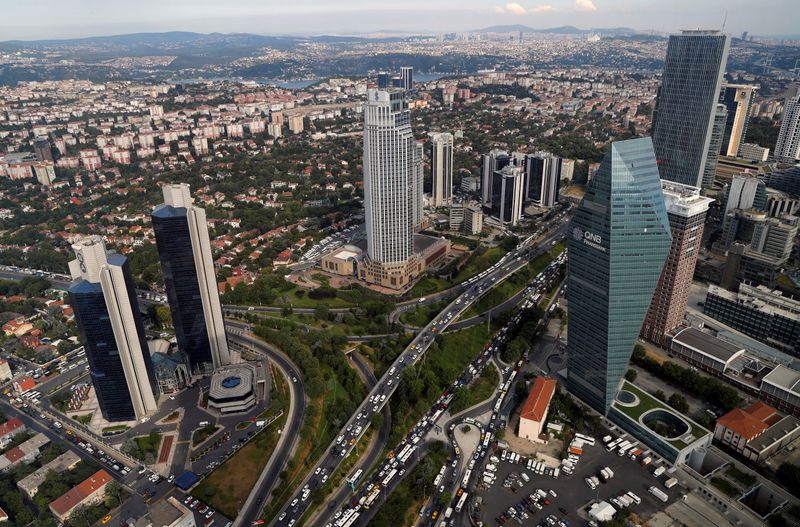By Ezgi Erkoyun
ISTANBUL (Reuters) - Turkey's economy is expected to contract this year for the first time in more than a decade as the coronavirus pandemic and related restrictions hit demand, but will bounce back next year, according to a Reuters poll published on Friday.
The median forecast in a July 21-23 survey of 42 economists in and outside the country was for a contraction of 4.3% in 2020, with drops in the second and third quarters of 12.2% and 3.1% respectively.
But the Turkish economy is expected to grow next year by 4.5%, according to the median forecast.
"We are seeing a U-shaped recovery in the Turkish economy right now ... However, the uncertainties about a possible second wave of the outbreak necessitates a cautious approach to these economic recovery scenarios," said Enver Erkan, economist at Tera Yatirim.
There are downside risks to growth next year, Erkan said, adding that tensions between the United States and China will have an impact too.
"I am not saying everything will be alright in 2021, we will be in a process of changing back," he said.
The government had forecast 5% economic growth this year before the coronavirus outbreak and has since maintained the economy could still grow this year, following a robust 4.5% expansion in the first quarter.
But economic activity declined sharply in the second quarter as Ankara shut schools and some businesses, closed borders and adopted weekend lockdowns to slow the spread of the coronavirus. It has started taking steps to re-open the economy since June.
POLICY RATE
Turkey's economy last contracted on an annual basis in 2009, by 4.7%. From 2010 to 2018, its average growth rate was more than 5% thanks mainly to a construction boom driven by cheap capital following the global financial crisis.
A currency crisis in 2018 was set off by concerns over central bank independence and tensions between Ankara and Washington. That led to three straight quarters of economic contraction and a modest annual growth rate of 0.9% last year.
Since last year, the central bank has cut rates to 8.25% from 24%, at first to pull the economy out a recession and later to counter the impact of the coronavirus pandemic.
In the poll, economists predicted the central bank would cut its policy rate to 8.00% by the end of this year.
It has bought up government debt at record levels since the end of March in the face of the outbreak. Economists have said the bond buying scheme and use of reserves to boost the Turkish lira have left the central bank with less room to manoeuvre.
"(The central bank moves) bears the risk of raising inflation, further deteriorating investor confidence and triggering another balance-of-payments crisis," Allianz (DE:ALVG) said in a note.
Allianz predicts Turkey will return to its pre-crisis level of GDP in mid-2022.
Inflation, which has hovered around 12% the last few months, was expected to decline to 10.2% by the end of the year and to 9.9% by the end of 2021.
The current account balance, which recorded a rare surplus last year as the economy slowed, has since returned to a deficit. The deficit is expected to stand at 2.3% of GDP this year and next, according to the poll.
(For other stories from the Reuters global long-term economic outlook polls package:)

(Polling by Manjul Paul in Bengaluru; Writing by Ezgi Erkoyun; Editing by Alison Williams (NYSE:WMB))